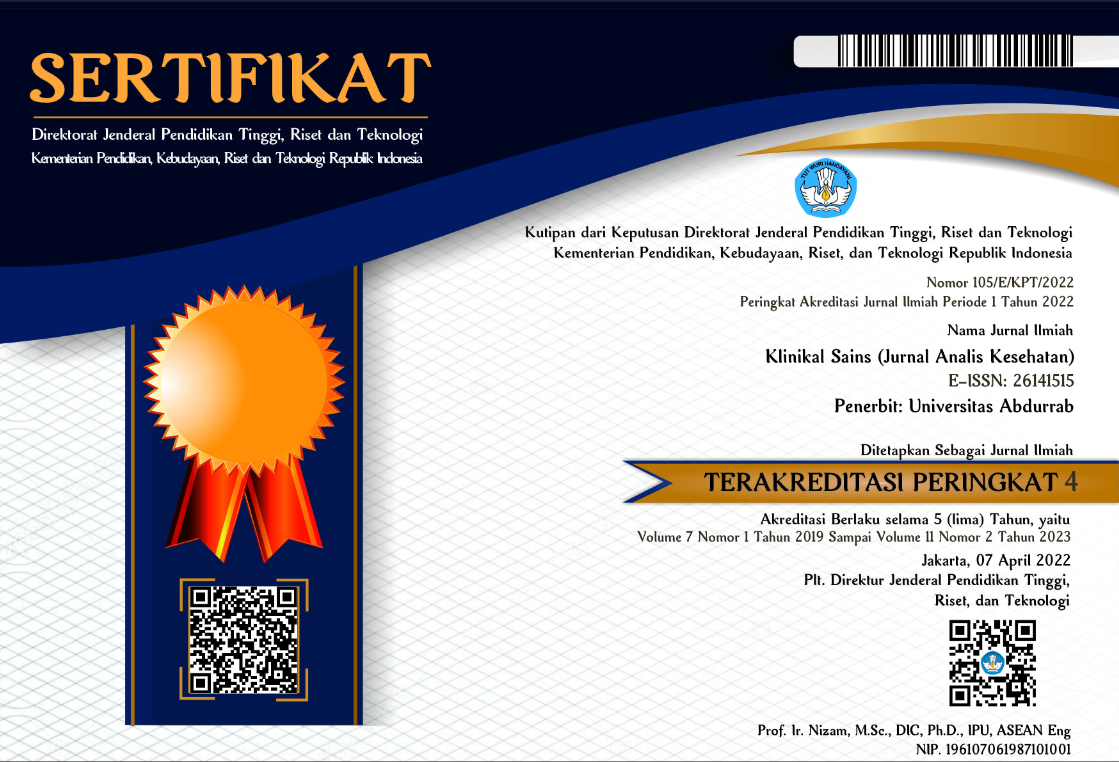PENGARUH VARIASI WAKTU PENDINGINAN CARBOL FUCHSIN TERHADAP HASIL PEMERIKSAAN BASIL TAHAN ASAM
Abstract
Microscopic examination with Ziehl Neelsen staining is one way to confirm the diagnosis of tuberculosis. Ziehl Neelsen staining has 3 reagents, namely carbol fuchsin 1%, alcohol acid 3%, and methylene blue 0.1%. Based on Standard Operating Procedures, the carbol fuchsin cooling process is carried out for 5-7 minutes. The aim of this research was to determine the effect of varying carbol fuchsin cooling times of 6 minutes, 8 minutes, 10 minutes and 12 minutes on the results of BTA microscopic examination. This type of research is an experiment with a completely randomized design (CRD). The samples used were BTA (+3) sputum specimens from RSUD. Abdoel Wahab Sjahranie 3 pots. The quality assessment of BTA preparations was carried out by the East Kalimantan Provincial Health Laboratory. BTA preparations were given 4 treatments varying in carbol fuchsin cooling time, namely 6 minutes, 8 minutes, 10 minutes and 12 minutes, then repeated 6 times and analyzed using the Chi-Squared test. The results of this study were that all BTA preparations that were treated with variations in carbol fuchsin cooling time were of good quality based on 6 criteria for good preparations with an average scoring of 100% in the 6 minute treatment, 98.3% in the 8 minute treatment, 96.6% in the 8 minute treatment. 10 minutes and 95% in the 12 minute treatment. Based on the results of the Chi-Squared test analysis of cleanliness criteria, a p value of 0.000 was obtained, indicating that there was no significant influence between variations in carbol fuchsin cooling time on the results of BTA microscopic examination. Thus, during the cooling stage, carbol fuchsin can be used for a duration of 5-7 minutes to produce a good quality preparation.
Copyright (c) 2023 Klinikal Sains : Jurnal Analis Kesehatan

This work is licensed under a Creative Commons Attribution-NonCommercial-ShareAlike 4.0 International License.
1. Copyright of all journal manuscripts is held by the Klinikal Sains : Jurnal Analis Kesehatan
2. Formal legal provisions to access digital articles of electronic journal are subject to the provision of the Creative Commons Attribution-ShareAlike license (CC BY-NC-SA), which means that Klinikal Sains : Jurnal Analis Kesehatan is rightful to keep, transfer media/format, manage in the form of databases, maintain, and publish articles.
3. Published manuscripts both printed and electronic are open access for educational, research, and library purposes. Additionally, the editorial board is not responsible for any violations of copyright law.
licensed under a Creative Commons Attribution-ShareAlike 4.0 International License.
 pdf
pdf
 Abstract views: 96
Abstract views: 96
 downloads: 109
downloads: 109

 :
:






